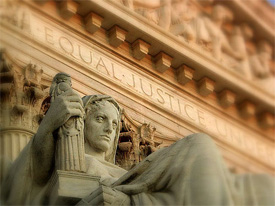Will Verizon Challenge the Government’s Fishy Dragnet?
Tim Edgar has a fascinating post on how the SCOTUS decision in Yates v US — in which a guy busted for throwing away undersized fish was let off because those fish do not constitute a tangible object under the law — might have repercussions for the phone dragnet.
The Supreme Court let Yates off the hook. Five justices agreed that a fish is not a tangible object. At first blush, this seems a bit implausible. Justice Kagan certainly thought so. Her eloquent dissent cites Dr. Seuss’s One Fish Two Fish Red Fish Blue Fish – for a time, my favorite book – as authority that fish are, indeed, tangible objects. I expect it is the first use of any book by Dr. Seuss as legal authority in an opinion of the Supreme Court, and I must say that I found it squarely on point, if not ultimately persuasive.
Justice Ginsburg’s opinion for the plurality explains that fish are not tangible objects because “in law as in life . . . the same words, placed in different contexts, sometimes mean different things.”
[snip]
Surprisingly, Yates has real implications for national security surveillance. The NSA’s bulk collection of telephone records is based on section 215 of the Patriot Act, which amended the business records provision of the Foreign Intelligence Surveillance Act (FISA). That provision is titled “Access to certain business records for foreign intelligence and international terrorism investigations.” It allows the government to obtain an order from the FISA court “requiring the production of any tangible things(including books, records, papers, documents, and other items)” in national security investigations.
Does this literally mean “any tangible things,” or is this just a catch-all ensuring that all types of business records are covered? While the provision is very broad even if limited to business records or data, until Yates it might have meant literally anything at all. For example, it might be tempting for the government to use it to obtain, in national security investigations, the kind of physical items that would otherwise have required a physical search order. As a FISA business records order requires only relevance, and not probable cause, that would be a dangerous loophole. Yates closes it.
Perhaps more to the point, Yates also weakens the government’s bulk collection theory for telephone records. While Yates is interpreting a different statute, the logic is clear: the words “any tangible things” should not be read literally. Instead, they must be read in context, taking account of the words immediately surrounding it, the title of the section, the structure of the law, and its purpose. Read in this way, it is clear that “tangible things” should not be read to encompass things far afield from the sorts of business records that Congress expected would be sought in national security investigations.
[snip]
Bulk collection is qualitatively, not just quantitatively, different from the sorts of requests for records, documents, or other “tangible things” ordinarily made by government both in law enforcement and intelligence investigations.
Steve Vladeck made a similar observation on Twitter earlier today, so Edgar is not the only one raising this question.
As it happens, today is dragnet renewal day. Which not only means that some FISC judge will reapprove the dragnet, but that providers will get new Secondary Orders. And — as happened in January 2014, when Verizon challenged an order based on Richard Leon’s decision in Klayman v. Obama — that presents the providers with an opportunity to challenge the order based on new legal developments.
And it’s not just Verizon that has a new opportunity to challenge the government’s fishy dragnets.
I’ve long suspected that the government has, in limited fashion, used Section 215 to obtain DNA material (they have databases of DNA from Gitmo detainees, for example, and I can imagine that they’d love to obtain DNA samples where they exist).
More interestingly, we’ve been talking about the government’s use of Section 215 to obtain Internet data, probably in hacking investigations. If, as a number of people suspect, they’re using it to get data flow records, that may be deemed even further away from common definitions of “tangible things.” And the Internet companies are riled up.
So let’s have it, providers! Some challenges to the fishy dragnet!
Update: In the post announcing the reauthorization (yesterday, actually) of the dragnet, I Con the Record noted that this one expires on June 1. I suppose that’s designed to add pressure on the reauthorization fight. I think that works out to be a 95 day dragnet.

